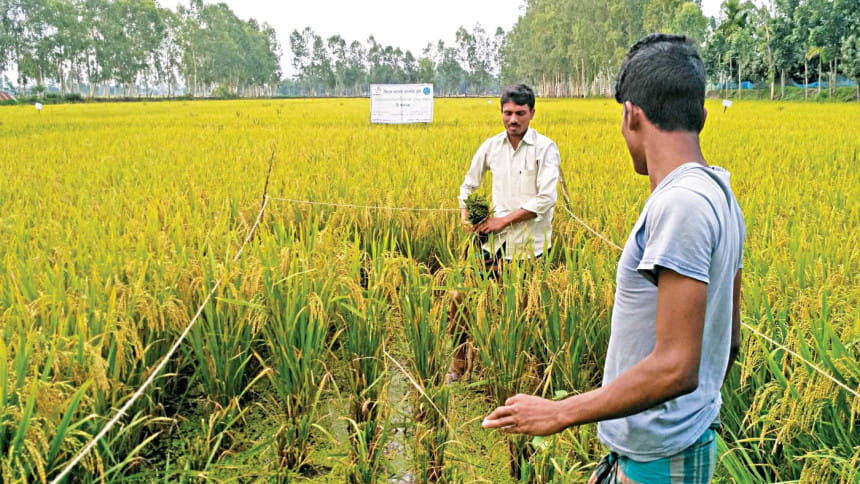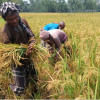Cultivation of zinc-rich paddy growing in Rangpur

Zinc-enriched paddy cultivation is expanding day by day across five districts of the Rangpur division thanks to increased demand for the crop given its immunity-boosting properties.
Only a handful of farmers were engaged in growing zinc-rich paddy when the crop was first introduced in the northern region eight years ago, prompting Natun Zibon Rochi (NAZIR), a non-government organisation, to start working to encourage cultivation of the crop.
Now, thousands of farmers are benefiting from the comparatively higher yields provided by this variety of paddy. In order to bolster production, the government is preparing to officially procure the crop.
Zinc-enriched paddy has been cultivated on 99,000 hectares of land in Rangpur this year, up 24 per cent compared to 80,000 hectares in 2021, according to the Department of Agricultural Extension (DAE).
Eight years ago, it was cultivated on just 900 hectares of land with each hectare yielding about seven tonnes of paddy.
The demand for zinc-enriched paddy has grown significantly as experts are calling for people to consume more healthy foods in a bid to boost their immune system.
Hemanta Chandra Sen, a farmer and trader of zinc-enriched paddy seeds in Shafirhat village under Patgram upazila of Lalmonirhat, has been cultivating the crop on three bighas of land for the last four years.
"Everyone in my family eats zinc-enriched rice, which tastes delicious and is very beneficial for growth and immunity," he told The Daily Star.
At first, people were reluctant to try their hand on the zinc-rich paddy farming, but following the Covid-19 pandemic, many started paying for seeds in advance.
"So, the number of farmers cultivating this paddy is increasing," Sen added.
Gyanada Rani, a farmer in Dalgram village of Kaliganj upazila in Lalmonirhat, says NAZIR has helped her secure zinc-enriched paddy seeds, which she planted on three bighas of land and got 62 maunds of the crop.
"Zinc-rich paddy is less susceptible to pest attacks and diseases compared to other varieties," Rani said, adding that she will increase cultivation next year.
Lutfar Rahman, a farmer from the same village, grew zinc-enriched paddy on one bigha of land six years ago just to feed his family. But after seeing the benefits, he has brought six bighas of land under the cultivation of the crop variety.
Many people now buy zinc-rich rice from Rahman and after seeing his success, other farmers have started jumping on the bandwagon of cultivating the crop.
Sultan Hossain, a rice trader in Lalmonirhat town, has been buying zinc-rich paddy directly from farmers to produce rice for the last six years.
Although the crop is more nutritious, its price is comparatively the same or lower compared to other varieties.
"The demand for zinc rice has multiplied with a lot of consumers coming to me for the crop following the advice of doctors," he said.
Hossain and other traders like him sell an average of five tonnes of zinc rice per day.
"We had faced troubles in attracting farmers to cultivate zinc paddy initially. Now farmers have understood its importance and are taking initiatives on their own to cultivate the paddy," said Mosharof Hossain, project manager of NAZIR.
The NGO also works to connect farmers with millers and traders.
NAZIR is implementing the Commercialisation of Bio-fortified Crops (CBC) programme, an initiative of the Global Alliance for Improved Nutrition (Gain) and HarvestPlus.
The CBC programme acts to catalyse commercial markets for bio-fortified seeds, grains, and food products in six countries -- Bangladesh, Kenya, India, Nigeria, Pakistan, and Tanzania -- with pervasive levels of malnutrition.
By developing commercial markets for bio-fortified crops that are primarily grown by smallholder farming families, the CBC programme will help create a sustainable basis for improving diet quality and tackling hidden hunger among farmers and consumers.
The programme, funded by the German Federal Ministry for Economic Cooperation and Development and the government of the Netherlands, aims to reach 190.6 million people with bio-fortified foods by 2022 and 571.8 million people by 2028.
The CBC programme works with country partners on a value-chain approach to create sustainable commercial pathways for bio-fortification. Existing value chains for comparable non-bio-fortified staple crops and foods are leveraged, and any gaps or barriers in production or trading are identified and addressed.
Hamidur Rahman, deputy director of the Lalmonirhat DAE, says since farmers are accustomed to cultivating other varieties of paddy, they initially showed little interest in cultivating the zinc-enriched version.
"But in recent times, many of them have benefited by cultivating the paddy and as such, other farmers are becoming more interested in this regard. So, the DAE gives advice to the farmers," Rahman said, adding that the market for zinc-enriched paddy will surge in the future.
Rafiqul Islam, district food controller in Lalmonirhat, says a proposal has been sent to the concerned ministry to officially procure zinc-enriched paddy.
"As rice is supplied from government warehouses in the form of relief items, if the government procures zinc rice, it will reach marginalised people and benefit them."

 For all latest news, follow The Daily Star's Google News channel.
For all latest news, follow The Daily Star's Google News channel. 








Comments